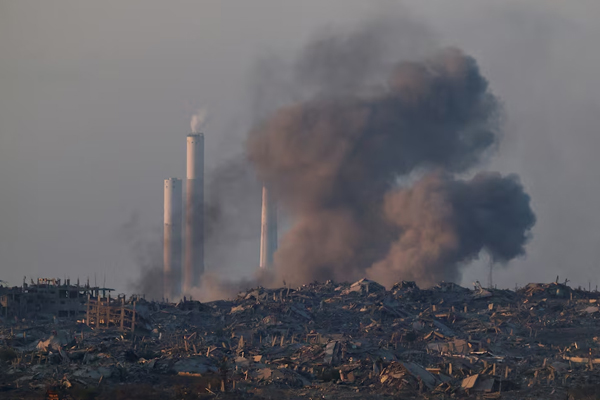
Hamas has accepted a 60-day ceasefire proposal with Israel, which entails releasing half of the hostages held in Gaza and Israel freeing some Palestinian prisoners, according to an Egyptian official source on Monday.
Senior Hamas official Basem Naim confirmed the group’s approval of the proposal, writing on Facebook: “The movement has handed over its approval to the new proposal presented by the mediators.”
Israeli media quoted Israeli sources as saying the Hamas response had been received.
There was no official response from Israel, but in a video from his office, Prime Minister Benjamin Netanyahu said: “I, like you, hear the reports in the media, and from them you can get one impression – Hamas is under immense pressure.”
The Egyptian official source stated that the agreement included a suspension of Israeli military operations for 60 days and outlined a framework for a comprehensive deal to end the nearly two-year conflict.
Proposal Mirrors Witkoff Plan
A source familiar with the negotiations said the proposal closely mirrored an earlier plan put forward by U.S. special envoy Steve Witkoff, which Israel had accepted.
The mediators met Hamas representatives in Cairo on Sunday, and Sheikh Mohammed bin Abdulrahman Al Thani, the Qatari prime minister, joined the discussions on Monday and met both Egyptian President el-Sisi and Hamas representatives, said an official briefed on the meetings.
Israel’s plans to seize control of Gaza City have stirred alarm abroad and at home, where tens of thousands of Israelis on Sunday held some of the largest protests since the war began, urging a deal to end the fighting and free the remaining 50 hostages held in Gaza since the Hamas attack on October 7, 2023. Israeli officials believe 20 are alive.
In an apparent show of force late on Monday, Israeli tanks advanced into the Sabra neighbourhood in the heart of Gaza City, according to witnesses who counted the presence of at least nine tanks and bulldozers.
Israel approved the plan to take control of Gaza City earlier this month, but officials had said it could take weeks to start, leaving the door open for a ceasefire, even though Netanyahu had said it would get underway “fairly quickly” and end the war with Hamas’ defeat.
Palestinians Fleeing Gaza City
Thousands of Palestinians, fearing an imminent Israeli ground offensive, have left their homes in eastern areas of Gaza City, now under constant Israeli bombardment, for points to the west and south in the shattered territory.
Netanyahu has described Gaza City as Hamas’ last big urban bastion. But, with Israel already holding 75% of Gaza, the military has warned that expanding the offensive could endanger hostages still alive and draw troops into protracted and deadly guerrilla warfare.
Dani Miran, whose son Omri was taken hostage on October 7, said he feared the consequences of an Israeli ground offensive in Gaza City. “I’m scared that my son would be hurt,” he told Reuters in Tel Aviv on Monday.
In Gaza City, many Palestinians have also been calling for protests to demand an end to a war that has demolished much of the territory and for Hamas to intensify talks to avert the Israeli ground offensive.
An Israeli armoured incursion into Gaza City could displace hundreds of thousands of people, many of whom have been uprooted multiple times during the war.
Ahmed Mheisen, Palestinian shelter manager in Beit Lahiya, a war-devastated suburb abutting eastern Gaza City, said 995 families had departed the area in recent days for the south.
“I am heading south because I need to ease my mental state,” Mousa Obaid, a Gaza City resident, told Reuters. “I do not want to keep moving left and right endlessly. There is no life left, and as you can see, living conditions are hard, prices are high, and we have been without work for over a year and a half.”
Ceasefire Talks
The last round of indirect ceasefire talks ended in deadlock in late July, with the sides trading blame for its collapse.
Israel has said it will agree to cease hostilities if all the hostages are released and Hamas lays down its arms – the latter demand publicly rejected by the Islamist group until a Palestinian state is established.
A Hamas official told Reuters earlier on Monday that the group rejected Israeli demands to disarm or expel its leaders from Gaza.
Sharp differences also appeared to remain over the extent of an Israeli withdrawal from Gaza and how humanitarian aid will be delivered around the enclave, where malnutrition is rife and aid groups warn of unfolding famine.
U.S. President Donald Trump wrote on his social media platform on Monday: “We will only see the return of the remaining hostages when Hamas is confronted and destroyed!!! The sooner this takes place, the better the chances of success will be.”
The war began when Hamas-led militants stormed across the border into southern Israel, killing 1,200 people and taking 251 hostages back to Gaza, according to Israeli tallies.
More than 61,000 Palestinians have since been killed in Israel’s ensuing air and ground war in Gaza, according to local health officials who do not distinguish between fighters and non-combatants.
Five more Palestinians have died of malnutrition and starvation in the past 24 hours, the Gaza health ministry said on Monday, raising the number of people who died of those causes to 263, including 112 children, since the war started.
(With inputs from Reuters)




